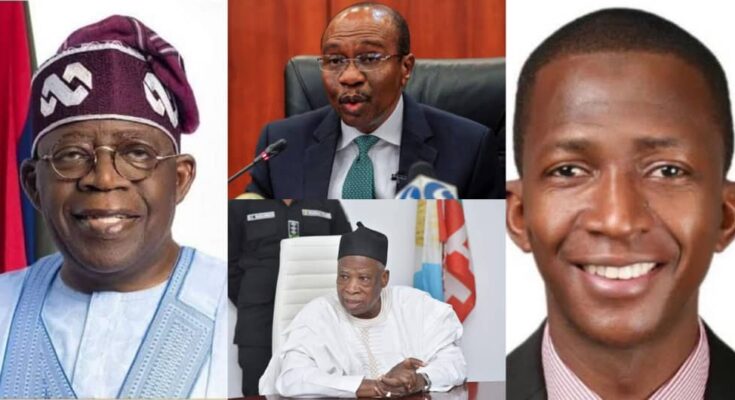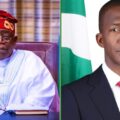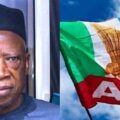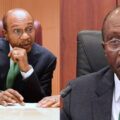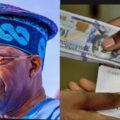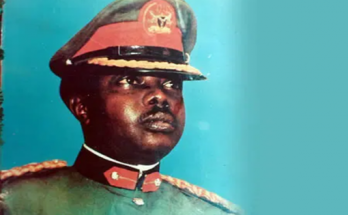Nigerian politics can be full of drama and power struggles. Recently, there have been talks about a controversial topic: some Nigerians are beginning to suspect that President Bola Ahmed Tinubu, a powerful political leader, is indirectly attacking former President Buhari’s government.
The reason for this claim is that Tinubu has suspended important figures who were known to support Buhari, including EFCC Chairman Abdulrasheed Bawa, CBN Governor Godwin Emefiele, and APC’s Secretary Adamu.
This suspension move has caught everyone’s attention, and people are debating Tinubu’s intentions and motives.
Some believe that these suspensions might be Tinubu’s way of secretly undermining Buhari’s government while trying to increase his own influence and power.
Now let us embark on a journey to revisit the experiences of these suspended individuals, examining the circumstances surrounding their suspension.
1. Godwin Emefiele, former Central Bank Governor
President Bola Ahmed Tinubu suspended former Central Bank Governor Mr. Godwin Emefiele, from his position less than two weeks after he assumed office.
His suspension was attributed to the ongoing investigation of his office and planned reforms in the financial sector.
The Deputy Governor (Operations Directorate), Folashodun Adebisi Shonubi, was appointed as acting Central Bank Governor until the investigation and reforms were concluded.
Mr. Emefiele was appointed as the Central Bank Governor by former President Goodluck Jonathan in 2014 after his predecessor, Lamido Sanusi, faced political consequences when he criticized the policies of then-president Goodluck Jonathan.
Sanusi didn’t agree with Jonathan’s Seven-Point Agenda, suggesting it could have been simplified into three points.
Surprisingly, Tinubu, who disagreed with Sanusi’s removal, now faces accusations of doing the same thing he criticized.
Emefiele was given a second term of five years by Buhari in June 2019, which surprised many because he wasn’t from the northern region and wasn’t a member of the ruling party, the All Progressives Congress (APC), at that time.
During their tenure, the controversial naira redesign policy was introduced. It was believed that introducing new naira notes would address issues like vote-buying, insecurity, and inflation, among other things, but it faced heavy criticism from various quarters, including state governors and President Tinubu himself.
As the then-presidential candidate of the ruling All Progressives Congress (APC), Tinubu expressed concerns about the policy’s implementation and its adverse effects on ordinary Nigerians who faced difficulties accessing their money. His campaign team even claimed that the move was specifically targeted at him.
He specifically said just one month before the election
“If they like, they can change the ink in the naira note, we will shock them, we will win the election; the opposition (the umbrella party) will be defeated,”
Since his inauguration, President Tinubu has promised to review the naira swap policy, which he believed was too harshly applied by the Central Bank, especially considering the large number of unbanked Nigerians. During the review, he vowed to treat both old and new currencies as legal tender.
Abdulrasheed Bawa, the former Executive Chairman of the EFCC
Another significant event occurred amid the discussions about Tinubu’s alleged indirect attacks on Buhari’s government. Bawa, the EFCC chairman, was suspended from his position.
The suspension followed serious allegations of abuse of office against him. Now, the Deputy Governor (Operations Directorate), Abdulkarim Chukkol, is the acting EFCC chairman until the investigation is completed.
Buhari appointed Bawa as the EFCC chairman on February 24, 2021, replacing Ibrahim Magu, who had been suspended and retired from the police force as an Assistant Inspector General of Police.
In June of the same year of his appointment, Bawa hinted that the EFCC was investigating Tinubu, but he said it would take time.
He claimed that the EFCC asked for Tinubu’s asset declaration form. However, the Attorney-General of the Federation and Minister of Justice, Malami, disagreed with Bawa’s claim, saying they had no plans to investigate Tinubu.
There have been ongoing debates about Bawa’s actions and calls for his removal from various civil society organizations.
Recently, the former governor of Zamfara State accused Bawa of asking for a bribe to stop an investigation against him, an allegation Bawa denied. Additionally, Bawa faced criticism for spending much money on a trip to Saudi Arabia with his family.
The suspension of Bawa has been welcomed by many CSOs, who have been calling for his removal. They believe that the decision will help restore public confidence in the EFCC and send a signal to potential abusers of public office. The CSOs also call for a thorough investigation into Bawa’s tenure as the EFCC chairman to address misconduct and abuse of power.
Senator Abdullahi Adamu, former National Chairman of the All Progressives Congress Party
And finally, it is not a coincidence that the former National Chairman of the All Progressives Congress Party, Abdullahi Adamu, was allegedly pressured to resign from his post, according to the Daily Trust newspaper on Sunday night. He clarified that he would discuss his rumoured resignation once President Bola Tinubu returned from Kenya, where he’s attending the Fifth Mid-Year Coordination Meeting. It was reported that on Monday morning, he submitted his letter of resignation to the president to Femi Gbajabiamila, the chief of staff.
Buhari was the one who endorsed Adamu When the national chairmanship position became vacant, this might have been because of his role in opposing former Senate President Bukola Saraki, who went against the party’s wishes and emerged as the National Chairman of the APC in March 2022.
However, Adamu’s tenure as the APC chairman was short-lived, lasting only 15 months. The battle began when President Tinubu became the presidential candidate of the APC, Mr. Adamu and some members of the NWC didn’t support his ambition. Instead, they supported the then Senate President, Ahmad Lawan, who ended up coming in fourth in the party’s presidential primary on June 8, 2022.
Politics can be unpredictable, and Adamu, with decades of experience in politics, understood this. He had been involved in politics since 1977, Adamu served as the Nasarawa State governor between 1999 and 2007.
The question is who is going to be Tinubu’s driving force after removing these prominent figures?

